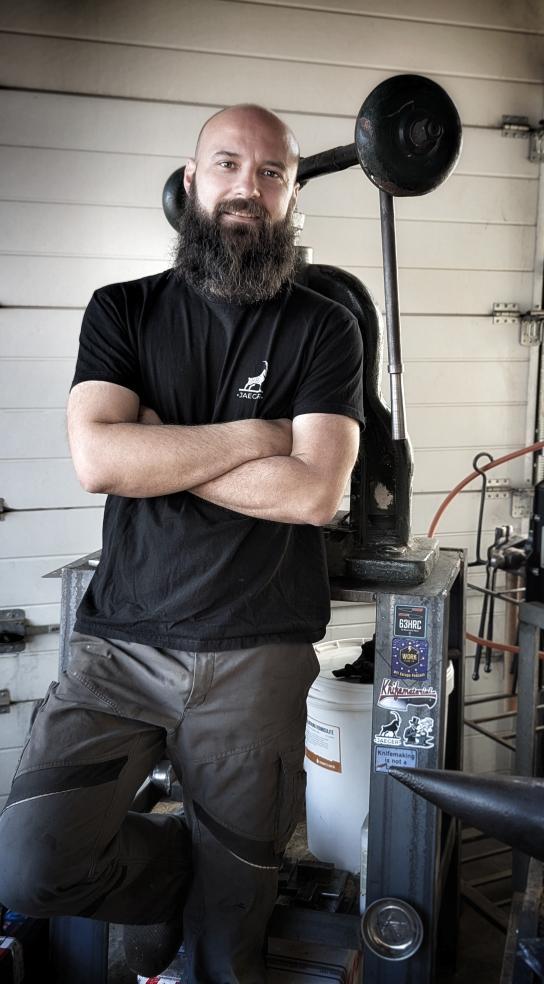
This week’s interview allows us to get to know a maker who found his way into knife making from a very unique way. I think what stood out to me the most was his love for life and learning things. I found it very contagious. There is very little I enjoy more than listening to someone speak about something they are passionate about. I am very happy to have the opportunity to share stories like this.
To start off, please tell us a little about yourself.
My name is Fabian Jäeger, I’m born in 1986 so only a few months left till I become 40, holy cow! I’m from Germany/Saxony living in a small-town south from Leipzig and west from Dresden. I’m married and I have two kids/boys (12&4).
I’m a hobby knife maker since 2017/2018 and fulltime since this year (2025). I have a normal high school diploma, not a university degree, and completed an apprenticeship as a process mechanic for plastics technology. I worked in this profession for approximately 20 years.
What sparked your interest in knives?
I was never a “knife guy”. I had a little slip joint knife in my pocket as little boy, that’s it. I was always interested in things and how they are made but not specifically knife related.
My interest in knives was sparked when I saw a video about how they are made. I was like “wow! I can do that?!” I have a kind of metal worker background, so I know how to work with metal, and I have always loved working with my hands.
So, it’s not just the knife that interests me, it’s also the process of making them.
What inspired you to do this, and how did you learn?
I can’t really say what exactly inspired me. Because I was always interested in how things are made this was something so different to all the things I did before. Working with metal and wood. The endless creativity. And the fact that I can make something useful. A useful tool. That was so amazing to me.
I learned everything by watching videos. I watched a lot of them, and everything was so interesting. Each new video inspired me to try something new. Everything was new to me, so I had a lot of ideas in my head.
When did you start making knives?
One day my YouTube algorithm shows me a video of how to make a knife, and I thought “why is it showing me this?!” I’d never searched for it , and I ignored it.
After a while I came across the same video again, and I thought “okay…. let’s watch this.”
And honestly, that was the moment I thought “Wait! That doesn’t look difficult! I will do that!!!” I guess that was in 2017.
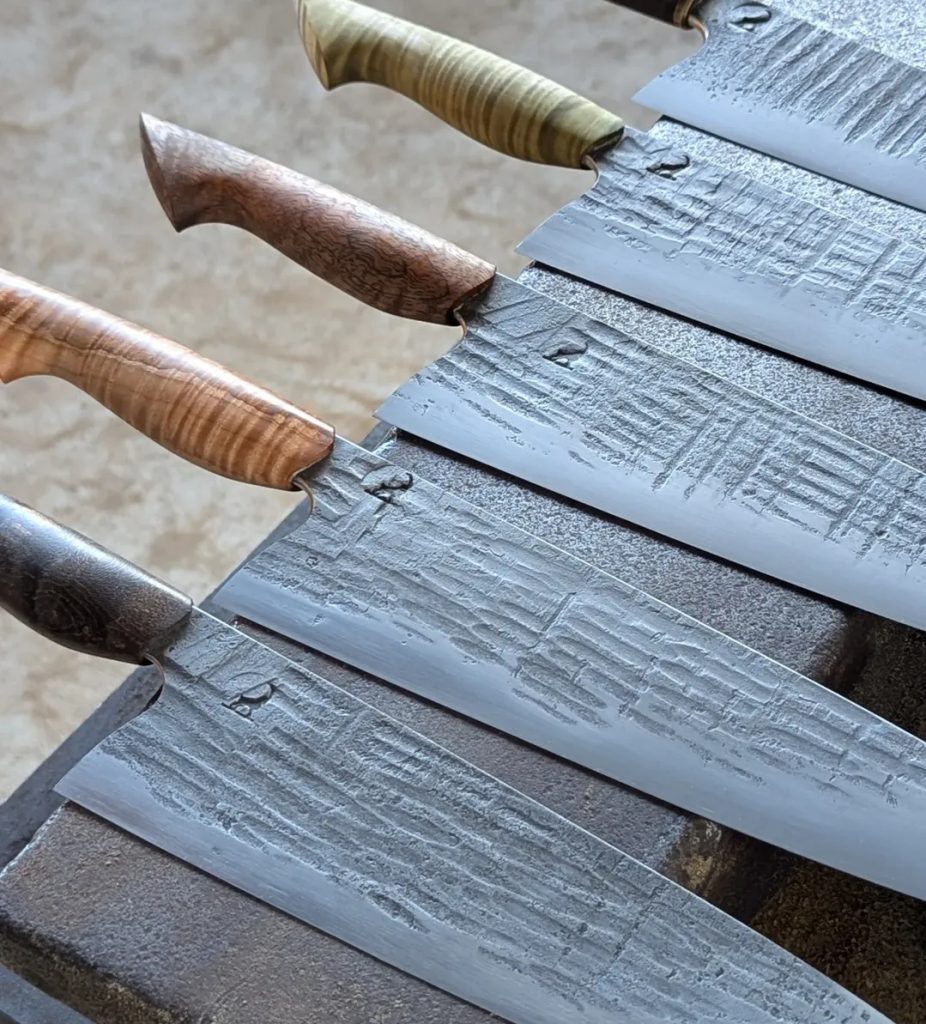
What did you make your first knife with?
My first ever knife was made out of mild steel with files and an angle grinder.
I knew back then that it was crappy steel, but I just wanted to try it out. I made the handle with beechwood scales and brass pins. It was so ugly, but I was so happy and proud of myself.
Do you have a favorite knife you made, tell me about it?
That’s a tough question. I don’t think I have a favorite. It’s hard for me looking at the knives I’ve made in the past because I think about how I would do it different. I always try to make a better knife than before.
What is the most important aspect of a well-made knife?
Speaking about kitchen knives, I’d say performance. It can look awesome but if it cuts like an axe, it’s not well made in my opinion.
But on the other hand, it can cut like a champion but if doesn’t look good….
I think several things have to mesh together. It just has to be harmonious. A well-made knife simply has to perform well.
But If I had to choose one thing, I would say – Geometry.
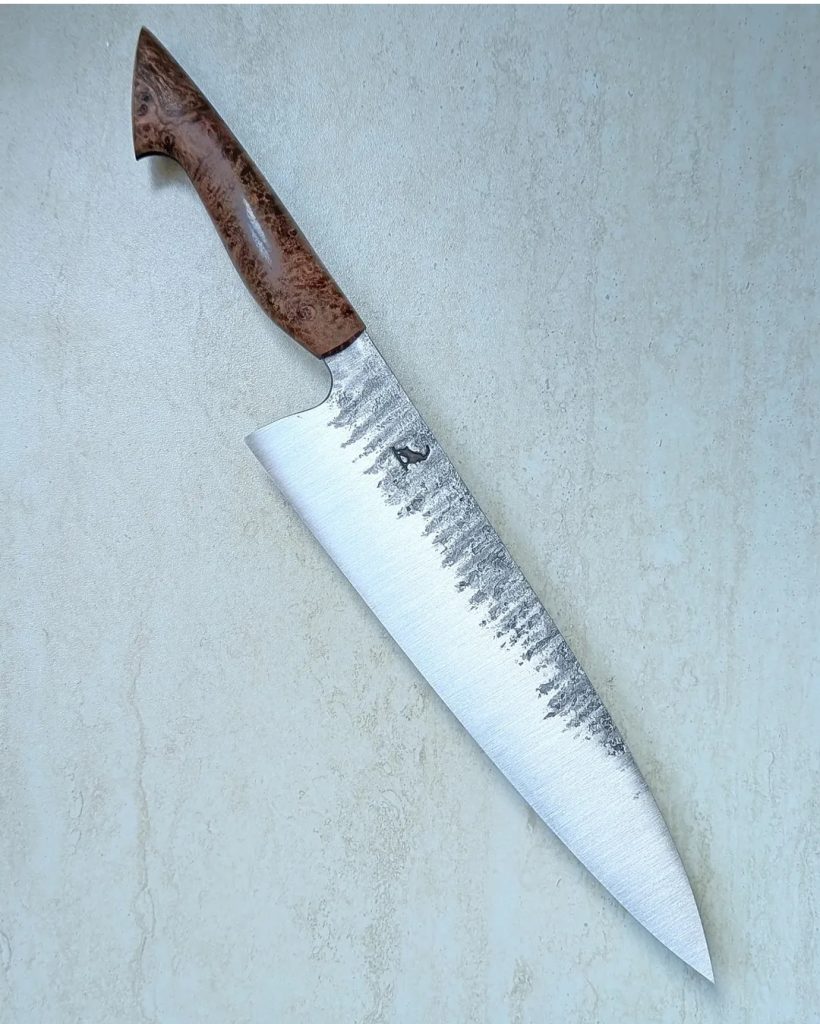
What keeps you going?
The endless possibilities. You never really get to the point where you can say, “That’s it, there’s nothing more you can do.” The fact that you can be completely creative is what makes it so exciting and never boring.
Biggest struggle?
Where should I start?! I think I struggle most with myself, with my perfectionism. When making knives, there are always things that drive you to despair. It’s only bad for me when I can’t find a solution to the problem, or when it stays with me forever.
What kinds of knives do you make?
I’ve made all types of knives in the past or in my beginning. But for the last few years, I only make kitchen knives.
Who helped you early on?
Nobody helped me. I didn’t have anyone local who could help me.
Who are your influences?
I’m actually influenced by everything I like. There are so many outstanding creators. So many different interpretations. I wouldn’t name anyone specifically.
What other knife makers out there impress you these days? Do you take inspiration from anyone else in the field?
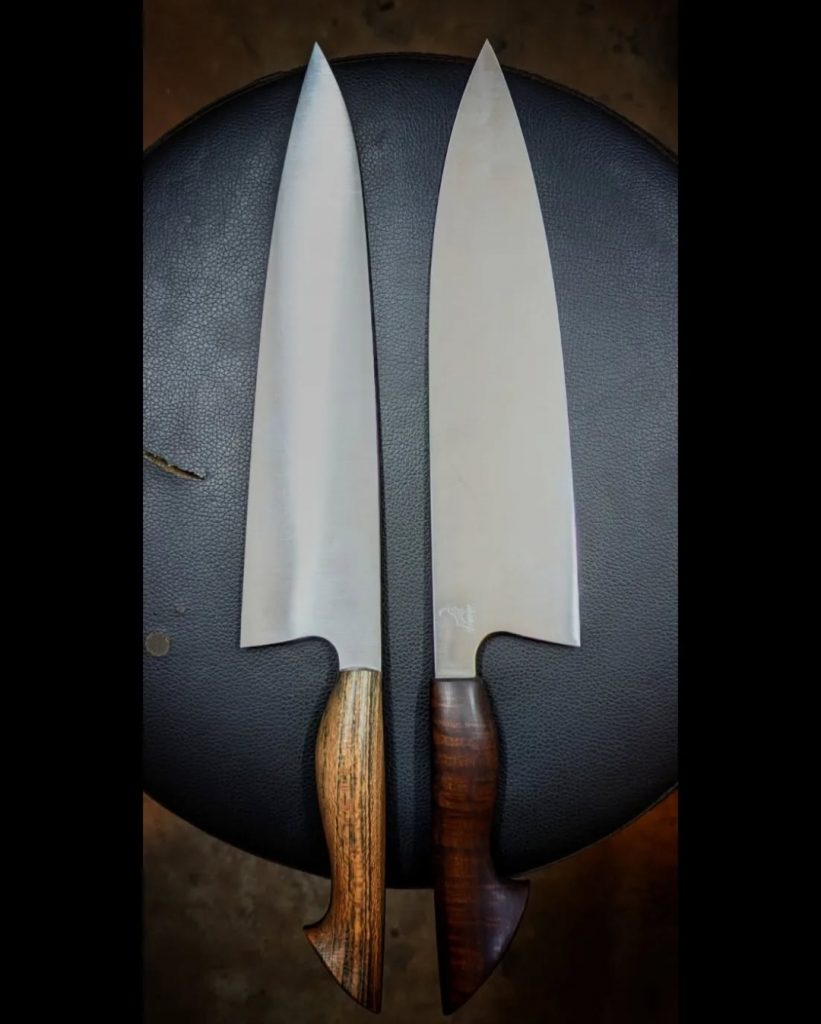
All the guys I follow on Instagram impress me a lot. But honestly, I can’t name anyone in particular. They’re all unique in their own way. And what people create never ceases to amaze me. It’s how I constantly get new ideas or rethink my own designs, for example.
Any specific breakthroughs or revelations in your knife making journey?
I’m still learning. It will never stop, I guess. The biggest step was buying a good belt grinder and moving into my new shop last year because I now can forge knives. Forging knives is a whole new journey for me.
What is the perfect knife?
I don’t think that there is a perfect knife out there. For me it is “perfect” when the customer is happy.
How do you approach knife testing?
The only test that really matters to me is how it performs. How easy is it to cut and how does the food release work? I test it on carrots, potatoes, onions, etc; so, I get a feel for how it performs.
How do you develop a design, select a steel, and fine-tune a heat treatment?
The development of my knives is mostly influenced by the customers I’d say. Over time, my design has changed significantly. Feedback and suggestions from customers and prospective customers have greatly influenced my design. This is how it has evolved gradually.
I’ve worked with many different steels, and I think this allows me to give good recommendations to customers. However, customers usually have specific ideas for their knives.
For my own projects, I prefer to use steels that are readily available and workable. There are numerous steels suitable for good chef’s knives, so the choice isn’t particularly difficult. Of course, it makes a difference whether I want to cut bones or just use a vegetable knife. I use the material that’s best suited for that purpose. But in general, in my opinion, good geometry trumps steel. The best steel is useless if the geometry isn’t right.
Heat treatment is a very complex subject. I send stainless or high-alloy steels to a professional. I only heat treat non-stainless steels myself. I think I can do that very well with my equipment. Fine-tuning is only effective if you can monitor and, above all, test it. Therefore, I rely on the data sheets for my heat treatment and adhere precisely to the specifications.
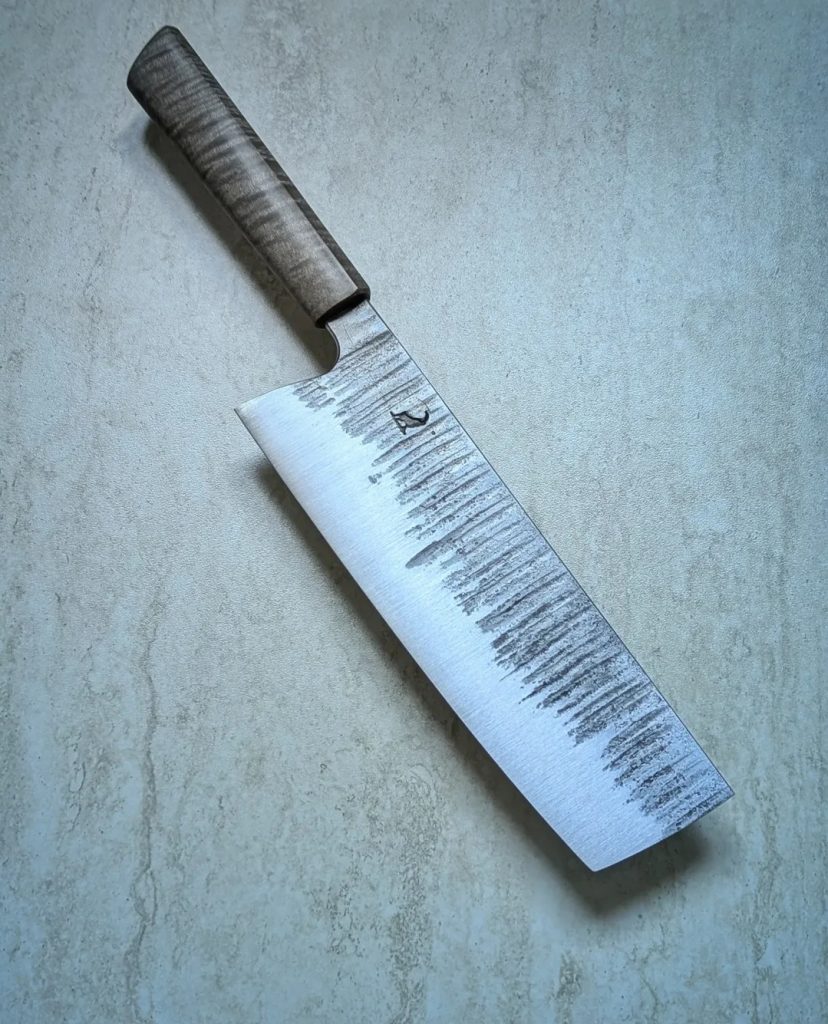
Any favorite steels, what do you like about them?
That’s a good question. As a knifemaker, I like steels that are easy to work with. They’re easy to forge, easy to grind, etc. One of my favorite steels is 52100. It’s very easy to work with, as is the heat treatment. And it has a very high potential to perform very well in the finished knife. And then there is Apex Ultra, which I’ve been working a lot with currently and I think it has the potential to become my favorite steel. It’s similar to 52100 in terms of machining, perhaps a bit more demanding, but performs even better. So, I generally prefer low-alloy steels I’d say.
What’s up next for you? Any exciting new projects to tell us about?
For me, what I want to do now, is to further improve my forging processes and become more consistent. I’d also like to learn about laminated steel forging. I’m currently reading up on that. But that’s still in the future. First, I want to reach a higher level. One step at a time.
To learn more about his work, and find out about new releases check out his website, https://www.jaeger-knives.com/ Instagram https://www.instagram.com/_jaeger_fabian or YouTube https://www.youtube.com/@_jaeger_fabian
Leave a Reply